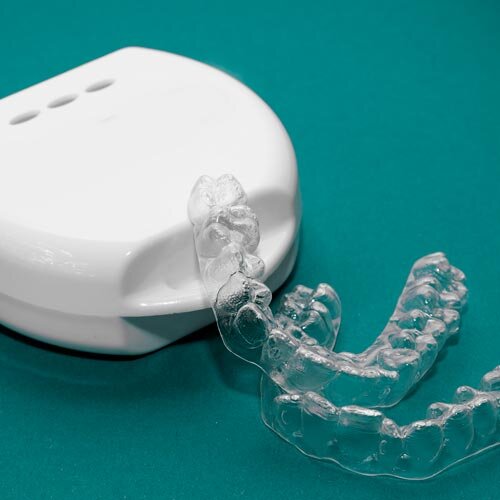← Return to list of treatments
Whangarei night and sports guards
Duration
Consultations – 30 mins
Preparation
Before – no preparation required.
Night guards
Excessive jaw clenching and teeth grinding (bruxism) can accelerate tooth and jaw deterioration. To help our patients most comfortably avoid this, we offer a range of night guards to protect their bite. The night guard acts as a cushion between the top and bottom dental arches.
What are the causes of teeth grinding?
Stress or anxiety
Obstructive sleep apnea
Certain medications or recreational drugs
Crossbite
What are the BENEFITS OF WEARING A NIGHT GUARD?
Prevents teeth damage – When someone suffers from bruxism, they unconsciously grind and clench their teeth causing chipped teeth, damaged fillings, and excessive wear on their enamel. The damage that occurs in your mouth can result in costly restoration procedures and even retreatment for your fillings. Wearing a night guard prevents your upper and bottom teeth from coming in contact reducing the chance of grinding and clenching.
Reduces headaches and pain – The grinding and clenching of your teeth can often cause jaw pain, tooth sensitivity, headaches, and a number of other pain related issues. Investing in a night guard helps to alleviate the pain and headaches associated with bruxism and other disorders.
Improves sleep patterns – Wearing a custom night guard helps to relieve the pain associated with bruxism while providing maximum comfort for your mouth. The night guard positions your jaw in a way that promotes muscle relaxation. Once the stress on your jaw is relieved, you now can finally get some sleep. Sleeping with a night guard has been found to improve sleep patterns drastically in bruxism sufferers.
FAQ – Night guards
-
A night guard, or bit guard, is recommended if you suffer from TMD (Temporomandibular Disorder/Disfunction) or you are a person who clenches or grinds your teeth out of habit or to cope with stress. Your dentist will help you determine is there are any underlying issues from that may be contributing to your clenching or grinding.
-
Bruxism is the term used to describe unusual clenching or grinding of teeth. Bruxism can be caused by stress or jaws that are out of alignment (TMD). People with bruxism will prematurely wear down their teeth as well as suffer from sore muscles, headaches, neck aches and even dizziness and ringing in the ears (tinnitis).
Many people are unaware that they do have bruxism and claim they do not grind or clench their teeth. However, there are many telltale signs of bruxism besides headaches and sore jaws. If the edges of your front teeth have little chips out of them or are flat, then you most likely are a grinder. Your dentist will help you determine if you have any signs of bruxism.
-
A night guard helps people with bruxism in a few ways. Not only does the night guard protect the teeth from wearing down any further due to grinding or clenching, but it also adds more “tooth length” to open the jaws slightly to take pressure off the TMJ (Temporomandibular Joint). The night guard is also used to reposition the lower jaw to aid in damaged TMJ healing. For some people, wearing a night guard makes them aware of the clenching and grinding and helps them to stop grinding or clenching.
-
The best way to clean your night guard is to rinse the guard off with water and brush with your normal toothbrush after use. It is best to store the night guard in a bit of clean water when not in use or to be placed in the protective case provided.
However, you may notice some white chalky deposits on your night guard after a few weeks of daily use. This white chalky substance is actually salt from your saliva that has adhered to the guard. The best way to remove these deposits is to soak your guard in some distilled vinegar for 20 minutes the brush with a tooth brush.
-
A night guard should be worn every night unless otherwise directed by your dentist. If your night guard is being used to correct TMD (Temporomandibular Disfunction/Disorder) problems, then you may be required to wear the guard at all times.
If you stop wearing your night guard for even a week, you will notice that the guard is tight and you feel pressure on your teeth. This is because teeth are always moving slightly. If you stop wearing your night guard for too long, it might not fit.
-
If you can no longer wear your night guard due to an extended period of not wearing it or a change has occurred to your mouth, the guard may be adjusted to fit again by your dentist. Only slight adjustments can be made to an ill-fitting night guard. If you have had some extensive dental work done or lost a tooth, you will most likely require a new night guard.
Sports mouth guards
Sports guards are an important piece of athletic equipment for anyone participating in a sport that involves falls, body contact or flying equipment. They typically cover the upper teeth, and are designed to protect against broken teeth, cut lips and other damage to your mouth.
Don't worry if you wear braces, or you have fixed dental appliances (such as a bridge) on your lower jaw. We offer a range of premade sports guards suitable for mouths of all shapes and sizes, in addition to mouth protectors for braces and lower teeth.
Why not get in touch with us today? When it comes to the very best for Whangarei night and sports guards, we pride ourselves on reliable staff and trusted expertise.
FAQ – Sports guards
-
A sports mouth guard should be worn when engaging in contact or ball sports to minimise injuries to teeth in the event of an impact. The guard will help cushion a blow as well as distribute impact forces over a broader area to minimise damage to one or more teeth. the guard also protects against damage from lower teeth being forced into upper teeth from an impact to the chin or the side of the face.
-
There are many types of sports mouth guards available. You can purchase ready-made or boil-and-bite sports guards from the internet or local pharmacist or sporting goods stores. There are sports guards for people with braces and young kids available. Your dentist can make a custom-fitted sports guard for a reasonable fee.
The number one factor in selecting a sports guard is the fit. If the guard does not fit securely around the teeth, then its effectiveness is greatly diminished. Sports guards that are too big or irritate the gums or lips will be uncomfortable to wear. Uncomfortable sports guards are always “played with” in the mouth and may not be in position when needed.
The boil-and-bite sports guards are the most popular and provide a reasonable level of protection. You simply drop the guard in hot water for a period (as stated in the product instructions), place on the upper teeth and bite down while pushing the guard against the gums with your fingers. As the guard cools, it retains the new shape. They are also ideal for kids wearing braces as they can be remoulded to accommodate tooth movement. However, they do not offer the same level of protection as a custom-fitted sports guard.
-
A ready-made or boil-and-bite guard should last for a season of sports activity. These types of guards deteriorate quickly from use. You may need to replace your ready-made guard frequently depending on how they are used.
-
Clean your sports guard with toothpaste and a toothbrush. If a toothbrush is not available after use, rinse it with water and store it until a toothbrush is available. Do not use hot water as all sports guards change shape with heat. Store your sports guard in a cool dry place when not in use.


